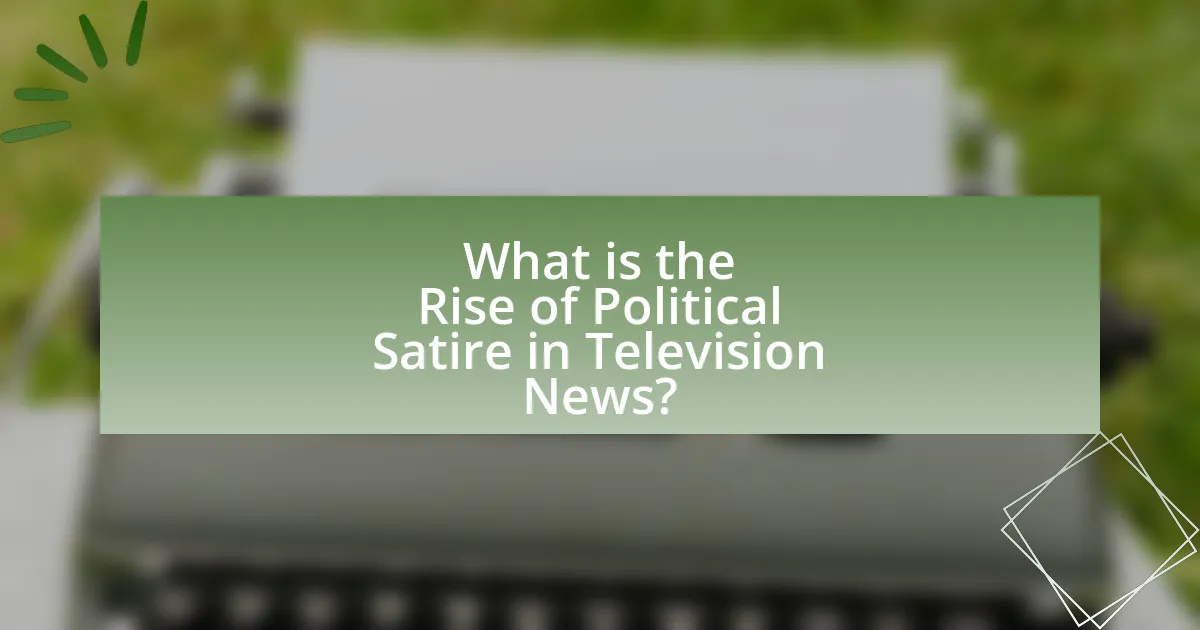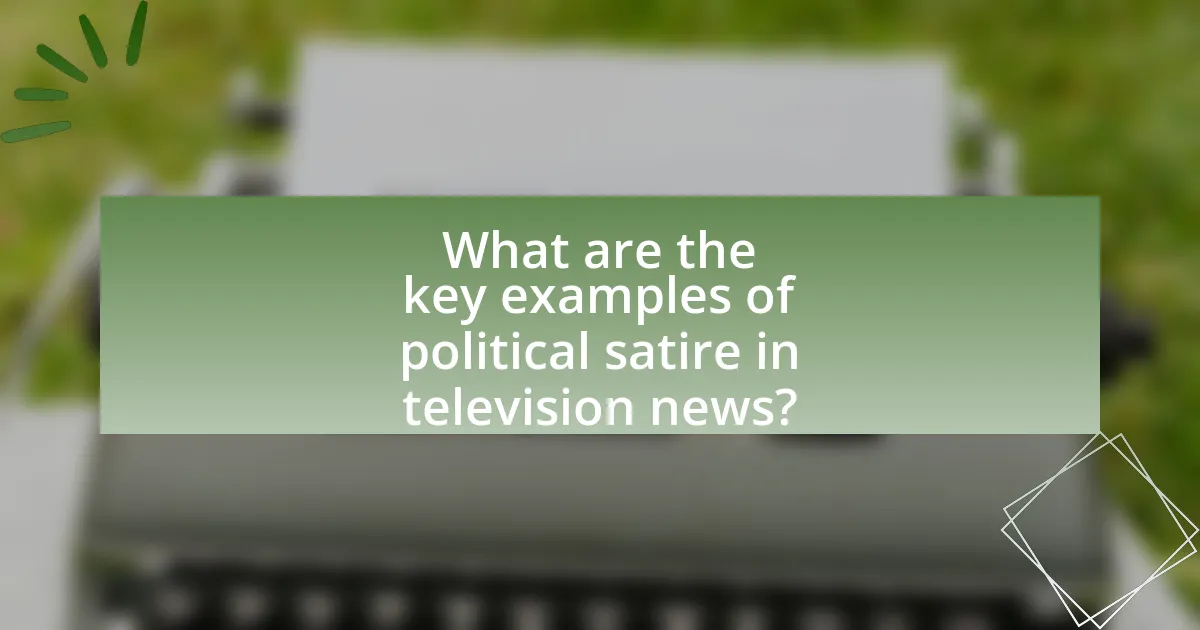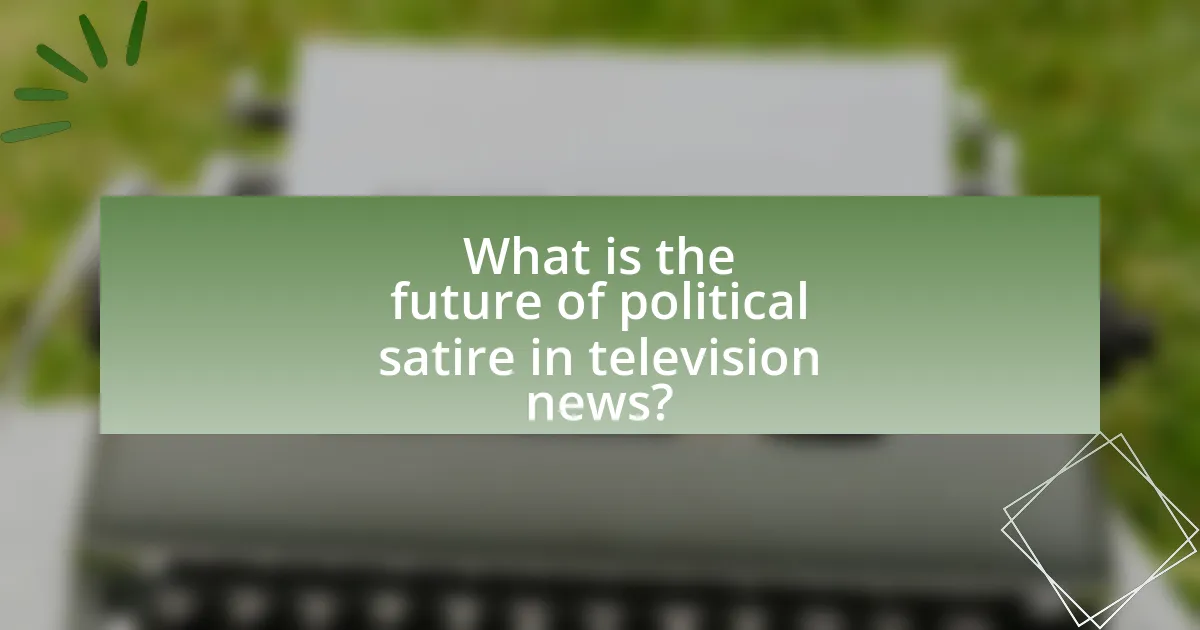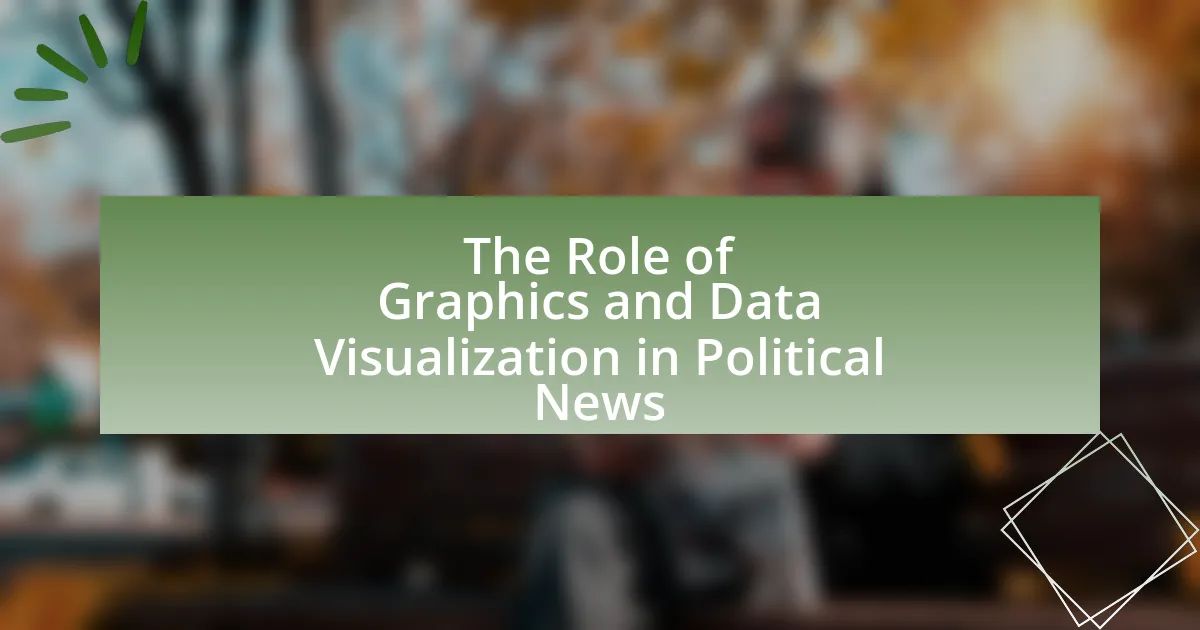The article examines the rise of political satire in television news, highlighting its increasing prominence through programs such as “The Daily Show” and “Saturday Night Live.” It discusses the evolution of political satire from the 1960s to the present, influenced by historical events and technological advancements, and its dual role as both an engaging tool for political critique and a potential source of misinformation. The article also explores the impact of political satire on public discourse, audience perception, and political engagement, while addressing the controversies and legal challenges faced by satirical news programs. Additionally, it considers the future of political satire in the context of changing political landscapes and audience preferences, emphasizing the importance of balancing humor with factual accuracy.

What is the Rise of Political Satire in Television News?
The rise of political satire in television news refers to the increasing prominence of comedic commentary on political events and figures, particularly through programs like “The Daily Show” and “Saturday Night Live.” This trend has emerged as audiences seek alternative perspectives on news, often blending entertainment with political discourse. Research indicates that political satire can enhance public engagement and awareness, with studies showing that viewers of satirical programs are more informed about political issues compared to those who consume traditional news. For example, a study published in the journal “Political Communication” found that exposure to political satire correlates with increased political knowledge and participation among younger audiences.
How has political satire evolved in television news over the years?
Political satire in television news has evolved significantly from the 1960s to the present, transitioning from occasional comedic segments to a dominant genre that shapes public discourse. Initially, shows like “That Was the Week That Was” introduced political humor, but the genre gained momentum with the emergence of programs such as “Saturday Night Live” and “The Daily Show,” which began to blend news with satire, influencing viewers’ perceptions of politics.
In the 2000s, the rise of digital platforms further transformed political satire, allowing shows like “Last Week Tonight with John Oliver” to reach wider audiences and engage in deeper investigative satire. This evolution reflects a shift in audience expectations, where humor is used not only for entertainment but also as a tool for political critique and social commentary. The impact of these shows is evident in their ability to drive conversations and mobilize viewers around political issues, demonstrating the significant role of satire in contemporary television news.
What historical events contributed to the rise of political satire?
The rise of political satire can be attributed to several historical events, including the establishment of the printing press in the 15th century, the French Revolution in the late 18th century, and the Watergate scandal in the 1970s. The printing press enabled the widespread distribution of satirical pamphlets, allowing for critiques of political figures and policies. The French Revolution fostered a culture of dissent and humor against authority, exemplified by the works of satirists like Honoré Daumier. The Watergate scandal marked a pivotal moment in American politics, leading to a surge in satirical commentary as television programs began to address political corruption and accountability, significantly influencing public perception and engagement with politics.
How have changes in technology influenced political satire in news?
Changes in technology have significantly influenced political satire in news by enabling rapid dissemination and accessibility of satirical content. The rise of social media platforms, such as Twitter and Facebook, allows satirical commentary to reach wider audiences instantly, often shaping public discourse and political narratives. For instance, shows like “Saturday Night Live” and “The Daily Show” have adapted their formats to include online clips that go viral, amplifying their reach beyond traditional television viewership. Additionally, advancements in video editing and production technology have enhanced the quality and creativity of satirical content, making it more engaging and impactful. This evolution has led to a more interactive relationship between audiences and satirical news, as viewers can share, comment, and participate in discussions, further influencing political opinions and actions.
Why is political satire considered a double-edged sword?
Political satire is considered a double-edged sword because it can simultaneously entertain and inform while also polarizing audiences and undermining trust in political institutions. On one hand, political satire effectively critiques power structures and encourages civic engagement by making complex political issues accessible and relatable, as evidenced by shows like “The Daily Show” and “Saturday Night Live,” which have historically influenced public opinion and voter turnout. On the other hand, it can reinforce existing biases and deepen societal divisions, as viewers may only engage with content that aligns with their beliefs, leading to echo chambers and a lack of constructive dialogue. This dual impact highlights the potential of political satire to both enlighten and mislead, making it a powerful yet risky tool in contemporary media.
What are the positive impacts of political satire on public discourse?
Political satire positively impacts public discourse by enhancing political engagement and fostering critical thinking among audiences. Research indicates that exposure to political satire increases viewers’ interest in political issues, as evidenced by a study published in the journal “Political Communication,” which found that individuals who consume satirical content are more likely to discuss political topics and participate in civic activities. Additionally, political satire serves as a tool for accountability, as it often highlights government failures and societal issues, prompting public scrutiny and dialogue. This form of media encourages audiences to question authority and consider multiple perspectives, ultimately enriching the democratic process.
What are the potential negative consequences of political satire?
Political satire can lead to misinformation and polarization among audiences. When satire is misunderstood, it can reinforce false beliefs or stereotypes about political figures or issues, as evidenced by studies showing that viewers often struggle to distinguish between satire and factual reporting. Additionally, political satire can deepen societal divides by creating echo chambers, where individuals only consume content that aligns with their pre-existing beliefs, thereby reducing constructive dialogue and increasing animosity towards opposing viewpoints.
How does political satire affect audience perception of news?
Political satire significantly shapes audience perception of news by framing political events in a humorous context, which can enhance engagement and critical thinking. Research indicates that viewers of political satire shows, such as “The Daily Show” and “Saturday Night Live,” often demonstrate increased awareness of political issues compared to those who consume traditional news formats. A study by the Pew Research Center found that 38% of Americans aged 18 to 29 reported getting their political news primarily from satirical sources, suggesting that satire influences their understanding and interpretation of current events. This engagement can lead to a more skeptical view of traditional news media, as audiences may perceive satirical content as more relatable and trustworthy, thereby altering their overall news consumption habits.
What role does humor play in shaping political opinions?
Humor plays a significant role in shaping political opinions by making complex political issues more accessible and engaging to the public. Political satire, often delivered through television news, simplifies intricate topics, allowing audiences to grasp key points while also provoking critical thought. Research indicates that exposure to satirical content can influence viewers’ attitudes and beliefs, as humor often highlights inconsistencies and absurdities in political discourse. For instance, a study published in the journal “Political Communication” by researchers at the University of Pennsylvania found that individuals who consume political satire are more likely to engage in political discussions and develop informed opinions. This demonstrates that humor not only entertains but also serves as a catalyst for political awareness and opinion formation.
How do viewers differentiate between satire and factual reporting?
Viewers differentiate between satire and factual reporting primarily through cues such as tone, context, and presentation style. Satirical content often employs humor, exaggeration, and irony to critique or comment on societal issues, while factual reporting adheres to journalistic standards of objectivity and accuracy. For instance, programs like “The Daily Show” or “Saturday Night Live” use comedic elements and absurd scenarios to highlight political absurdities, signaling to viewers that the content is not meant to be taken literally. In contrast, traditional news outlets like BBC or CNN focus on delivering verified information and factual analysis, which helps audiences recognize the difference. Research indicates that audience familiarity with the format and intent of the content plays a significant role in this differentiation process, as viewers often rely on their prior knowledge and media literacy to interpret the nature of the information presented.

What are the key examples of political satire in television news?
Key examples of political satire in television news include “The Daily Show,” “Saturday Night Live,” and “Last Week Tonight with John Oliver.” “The Daily Show,” which began airing in 1996, uses humor to critique political events and figures, significantly influencing public perception and political discourse. “Saturday Night Live,” known for its sketches and impersonations, has been a staple since 1975, often reflecting and shaping political narratives through satire. “Last Week Tonight with John Oliver,” launched in 2014, combines in-depth analysis with comedic commentary, addressing complex political issues and holding power accountable. These programs exemplify how satire can engage audiences and provoke thought on political matters.
Which television programs are known for their political satire?
Television programs known for their political satire include “Saturday Night Live,” “The Daily Show,” “Last Week Tonight with John Oliver,” and “The Colbert Report.” These shows utilize humor to critique political figures and current events, often influencing public opinion and political discourse. For instance, “The Daily Show,” hosted by Jon Stewart and later Trevor Noah, has been recognized for its impact on political awareness among younger audiences, as evidenced by studies showing that viewers often gain political knowledge from satirical content.
What techniques do these programs use to engage their audience?
Political satire programs engage their audience through humor, relatable content, and critical commentary. These techniques create an entertaining yet thought-provoking environment that encourages viewers to reflect on political issues. For instance, programs like “The Daily Show” and “Saturday Night Live” utilize satire to highlight absurdities in political events, making complex topics more accessible and engaging. Research indicates that humor can enhance information retention, as viewers are more likely to remember content presented in a comedic format. This combination of entertainment and education fosters a deeper connection with the audience, ultimately driving engagement and discussion around political matters.
How do these programs influence political engagement among viewers?
Political satire programs significantly enhance political engagement among viewers by making complex political issues more accessible and entertaining. These programs often use humor and satire to simplify intricate topics, which can lead to increased interest and understanding of political matters. Research indicates that viewers of political satire are more likely to discuss political issues and participate in civic activities, such as voting. For instance, a study published in the journal “Political Communication” found that exposure to satirical content correlates with higher levels of political knowledge and engagement, particularly among younger audiences. This suggests that political satire not only entertains but also serves as a catalyst for active participation in the democratic process.
What controversies have arisen from political satire in news media?
Controversies arising from political satire in news media primarily include accusations of bias, misinformation, and the potential to polarize audiences. Critics argue that satirical content often distorts facts for comedic effect, leading to misunderstandings about political issues. For instance, studies have shown that viewers of satirical news programs may develop skewed perceptions of political figures and events, as evidenced by research from the Pew Research Center, which found that audiences often struggle to differentiate between satire and actual news. Additionally, political satire can exacerbate societal divisions, as it tends to resonate more with like-minded individuals, reinforcing existing beliefs rather than fostering constructive dialogue.
How have public figures responded to political satire?
Public figures have responded to political satire with a mix of humor, criticism, and defensiveness. For instance, some politicians embrace satire, using it to connect with younger audiences, while others condemn it as unfair or misleading. A notable example is former President Barack Obama, who often appeared on satirical shows like “The Tonight Show” and “Saturday Night Live,” leveraging humor to engage with the public. Conversely, figures like Donald Trump have frequently criticized satirical portrayals, labeling them as “fake news” and attacking the credibility of the media. This duality illustrates how public figures navigate the landscape of political satire, either by engaging with it or pushing back against its narratives.
What legal challenges have been faced by satirical news programs?
Satirical news programs have faced legal challenges primarily related to defamation, copyright infringement, and the First Amendment. Defamation cases arise when individuals or organizations claim that satirical content has harmed their reputation; for instance, the case of “The Onion” being sued for defamation by a public figure highlights this issue. Copyright infringement can occur when satirical programs use copyrighted material without permission, as seen in disputes involving parody and fair use. Additionally, the First Amendment protections for free speech often come into conflict with claims of harm, leading to legal battles over the extent to which satire is protected under U.S. law. These challenges illustrate the complex legal landscape that satirical news programs navigate while attempting to balance humor and commentary with legal accountability.

What is the future of political satire in television news?
The future of political satire in television news is likely to see increased integration with digital platforms and a more significant role in shaping public discourse. As traditional news consumption declines, political satire programs are adapting by utilizing social media to reach younger audiences, evidenced by shows like “Last Week Tonight with John Oliver,” which has garnered millions of views online. This shift indicates that political satire will continue to evolve, leveraging technology to enhance engagement and influence. Furthermore, the growing polarization in politics suggests that satire will increasingly serve as a tool for both critique and affirmation, reflecting diverse viewpoints while also challenging power structures.
How might political satire evolve with changing political landscapes?
Political satire is likely to evolve by adapting its themes, targets, and methods in response to shifting political landscapes. As political issues and public sentiments change, satirical content will reflect contemporary events, utilizing humor to critique new political figures, policies, and societal trends. For instance, the rise of social media has already transformed how satire is disseminated, allowing for rapid responses to political developments, as seen with platforms like Twitter and TikTok where satirical content can go viral almost instantly. Historical examples include the shift in focus from traditional political figures to broader societal issues during times of social upheaval, such as the civil rights movement or the recent global pandemic, demonstrating that satire often mirrors the pressing concerns of the time.
What role will social media play in the future of political satire?
Social media will serve as a crucial platform for the dissemination and evolution of political satire in the future. It enables rapid sharing and engagement, allowing satirical content to reach wider audiences instantly, as evidenced by the viral success of satirical posts during major political events, such as the 2020 U.S. presidential election, where memes and short videos significantly influenced public discourse. Furthermore, social media’s interactive nature fosters direct audience participation, enabling users to create and share their own satirical content, thereby democratizing the production of political satire and challenging traditional media narratives.
How can political satire adapt to new audience preferences?
Political satire can adapt to new audience preferences by leveraging digital platforms and social media to engage younger demographics. This shift is evidenced by the rise of online satirical content, such as memes and short videos, which resonate more with audiences who consume news primarily through social media channels. For instance, shows like “Last Week Tonight with John Oliver” and “The Daily Show” have successfully integrated social media strategies, utilizing clips and interactive content to reach wider audiences. Additionally, tailoring humor to reflect current social issues and cultural trends enhances relatability, making satire more appealing. This adaptability is crucial as studies show that younger viewers prefer content that is both entertaining and informative, indicating a demand for satire that aligns with their values and communication styles.
What best practices can be adopted for responsible political satire?
Responsible political satire should prioritize accuracy, context, and respect for diverse perspectives. Accuracy ensures that the satire does not misrepresent facts or individuals, which can mislead audiences; for instance, satirical content should fact-check claims to avoid spreading misinformation. Context is crucial, as satire should be grounded in current events and societal issues, allowing audiences to understand the underlying message without confusion. Respect for diverse perspectives involves avoiding harmful stereotypes and promoting constructive dialogue, which can foster understanding rather than division. These practices help maintain the integrity of satire while engaging audiences thoughtfully and responsibly.
How can satirical programs balance humor with factual accuracy?
Satirical programs can balance humor with factual accuracy by employing rigorous research and fact-checking processes alongside comedic elements. These programs often utilize a team of writers who are knowledgeable about current events and political issues, ensuring that the humor is rooted in reality. For instance, shows like “The Daily Show” and “Last Week Tonight” frequently reference credible sources and statistics to support their comedic narratives, which enhances their credibility while entertaining audiences. This approach not only engages viewers but also encourages critical thinking about the topics presented, as evidenced by studies showing that audiences retain factual information better when it is delivered in a humorous context.
What strategies can enhance the positive impact of political satire?
To enhance the positive impact of political satire, creators should focus on accuracy, relatability, and engagement. Accurate portrayals of political events and figures ensure that the satire resonates with the audience and fosters informed discussions. Relatable content allows viewers to connect personally with the satire, making it more impactful and memorable. Engaging formats, such as interactive segments or social media integration, can amplify reach and encourage audience participation, thereby reinforcing the satirical message. Research indicates that when satire is grounded in factual information, it can effectively promote critical thinking and civic engagement among viewers, as seen in studies by the Pew Research Center, which highlight the role of satire in increasing political awareness.




